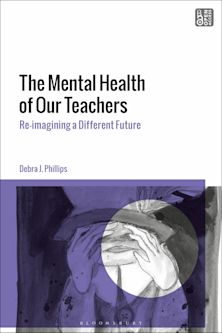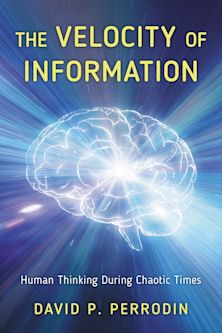- Home
- ACADEMIC
- Education
- Psychology and Education
- The Struggle for Identity in Today's Schools
The Struggle for Identity in Today's Schools
Cultural Recognition in a Time of Increasing Diversity
Patrick M. Jenlink (Anthology Editor) , Faye Hicks Townes (Anthology Editor) , Betty Alford (Contributor) , Julia Ballenger (Contributor) , Angela Crespo Cozart (Contributor) , Sandy Harris (Contributor) , Ray Horn (Contributor) , Patrick M. Jenlink (Contributor) , John Leonard (Contributor) , Vincent Mumford (Contributor) , Amanda Rudolph (Contributor) , Kris Sloan (Contributor) , Sandra Stewart (Contributor) , Faye Hicks Townes (Contributor) , Kim Woo (Contributor)
The Struggle for Identity in Today's Schools
Cultural Recognition in a Time of Increasing Diversity
Patrick M. Jenlink (Anthology Editor) , Faye Hicks Townes (Anthology Editor) , Betty Alford (Contributor) , Julia Ballenger (Contributor) , Angela Crespo Cozart (Contributor) , Sandy Harris (Contributor) , Ray Horn (Contributor) , Patrick M. Jenlink (Contributor) , John Leonard (Contributor) , Vincent Mumford (Contributor) , Amanda Rudolph (Contributor) , Kris Sloan (Contributor) , Sandra Stewart (Contributor) , Faye Hicks Townes (Contributor) , Kim Woo (Contributor)
For information on how we process your data, read our Privacy Policy
Thank you. We will email you when this book is available to order
You must sign in to add this item to your wishlist. Please sign in or create an account
Description
The Struggle for Identity in Today's Schools examines cultural recognition and the struggle for identity in America's schools. In particular, the contributing authors focus on the recognition and misrecognition as antagonistic cultural forces that work to shape, and at times distort identity. What surfaces throughout the chapters are two lessons to be learned in relation to identity. The first lesson is that identities and the acts attributed to them are always forming and re-forming in relation to historically specific contexts, and these contexts are political in nature, i.e., defined by issues of diversity such as race, ethnicity, language, sexual orientation, gender, and economics. The second lesson presented by the authors is that identity forms in and across intimate and social contexts, over long periods of time. The historical timing of identity formation cannot simply be dictated by discourse. The identities posited by any particular discourse become important and a part of everyday life based on the intersection of social histories and social actors. Importantly, the social-cultural use of identities leads to another way of conceptualizing histories, personhoods, cultures, and their distributions over social and political groups.
Table of Contents
Part 2 Introduction: Cultural Identity and the Struggle for Recognition
Chapter 3 Affirming Diversity, Politics of Recognition, and the Cultural Work of Schools
Chapter 4 Dialoguing Toward a Racialized Identity: A Necessary First Step in a Politics of Recognition
Chapter 5 Misrecognition Compounded
Part 6 Struggle for Recognition-Embracing Cultural Politics
Chapter 7 Recognition, Identity Politics, and English Language Learners
Chapter 8 Identity Formation and Recognition in Asian-American Students
Chapter 9 Curriculum and Recognition
Chapter 10 Extracurricular Activities and Student Identity
Chapter 11 Recognition, Identity Politics, and the Special Needs Student
Chapter 12 Athletes, Recognition, and the Formation of Identity
Chapter 13 Administrator to Parent Recognition: Treat Me with Respect
Chapter 14 Recognition and Parent Involvement
Chapter 15 Student Identity and Cultural Communication
Chapter 16 Value-Added Community: Recognition, Induction-Year Teacher Diversity and the Shaping of Identity
Chapter 17 Coda: Recognition, Difference, and the Future of America's Schools
Product details
| Published | Apr 16 2009 |
|---|---|
| Format | Ebook (PDF) |
| Edition | 1st |
| Extent | 232 |
| ISBN | 9798216317692 |
| Imprint | R&L Education |
| Publisher | Bloomsbury Publishing |
About the contributors
Reviews
-
This book provides for a broad and balanced base of considering diversity, culture and identity development in relationship to curriculum development with "recognition" being the pivotal concept in all of the writings. The identity and cultural diversity curriculum dimension will help scholar-practitioner leaders guide teachers and students through a broad understanding of themselves as they interact with one another. This is a very timely collection of writings.
Georgia A. King, associate superintendent, Beckville Independent School District
-
This fascinating collection offers a much-needed alternative perspective on usual understandings of what needs to happen in schools that are increasingly populated by diverse students and homogenous faculty. The book's juxtaposition of cultural recognition and identity politics within the contexts of contemporary schooling provides educators with frameworks for thinking more carefully about what they do and say every day in interactions with students, parents, and others in the community.
J. Amos Hatch, Professor of Urban-Multicultural Teacher Education, University of Tennessee, Professor of Urban-Multicultural Teacher Education, University of Tennessee
-
By bringing together an eclectic group of studies and perspectives, Jenlink and Hicks-Townes gives us fresh and innovative insights into the examination of cultural recognition and the struggle for identity in schools in the United States. The focus on the cultural components gives the chapters connection and relevance in our changing society. This book is well-designed to help those who seek new perspectives on their own identities and those they guide.
Jean Moule, associate rofessor of teacher education, Oregon State University, and president, Oregon Chapter of National Association of Multi
-
The authors have produced a thoughtful piece of work. They speak strongly to a form of school leadership that recognizes the value of cultural differences and how the identity of a school and its leadership impact the formation of the individual identities of students, teachers, and parents.
Perry Daniel, principal, Bethune Middle Academy, Shreveport, Louisiana
-
Jenlink and Hicks-Townes have recognized the need to explore the perspectives that educators and students bring to the schoolhouse based on their cultural experiences. This collection is a must-read for educational leaders who work with adults and children of varied cultural backgrounds.
Katie Chretien, Assistant Principal of Instruction, Vivian Elementary Middle/Magnet School, Caddo Parish Public Schools, LA


































